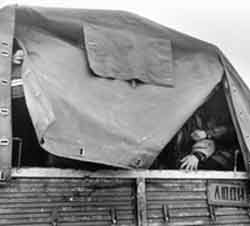Temporary Protection or What to Do with Them?
The introduction of temporary protection means that Chechens in the Czech Republic will not be granted refugee status, however, they will not have to leave our country for the time being
A comment by Marta Míšová, special to Prague Watchdog
On April 18, 2001 the Czech government issued resolution No. 352/2001, acknowledging the proposal of the government’s Council for Human Rights for “granting temporary protection to the citizens of the Russian Federation and other people who became refugees as a result of the armed conflict in Chechnya and who are staying in the territory of the Czech Republic.” At the same time, the government put the Minister of Interior in charge of preparing a draft version of the resolution-based regulation by June 30, 2001.
Chechen refugees started arriving to the Czech Republic in mid-1990s when the first Chechen war broke out. There are a few hundred of them in the Czech Republic today. Since 1999 they have had no opportunity of receiving a refugee status according to the Asylum Act, 1999 (No. 325/1999 of the Collection of Laws of the Czech Republic) because all asylum proceedings were “temporarily” suspended. If temporary protection is eventually introduced, it will bring no change to the situation. As a matter of fact, it will only consolidate it in legal terms.
If a foreign citizen comes to a country and claims a refugee status, the country has two options: either it accepts the claim, thus admitting implicitly that in the citizen’s country things do not go well, for its people feel “well-founded fear of race, religion or nationality discrimination against them …” (The Asylum Act, 1999, art. 12 (b)), or it turns down the application. In the latter case, if no other state is willing to admit the refugee, he or she must leave the country and travel back home.
As regards the conflict in Chechnya, both options are difficult to realize: the acceptance of a refugee’s claim has its legal and political aspects and denial is problematic from the legal and humanitarian point of view. There are two facts against the acceptance of a Chechen refugee’s claim. First, the interpretation of the provisions-in-question of the Convention relating to the Status of Refugees, 1951 as well as The Asylum Act, 1999 seems to be rather narrow (for well-founded fear of discrimination must be proved in every individual case). Second, the Czech Republic keeps the interest of having good relations with the Russian Federation (mass granting of the refugee status to Chechen refugees would de facto mean condemnation of Russian policy in Chechnya).
On the other hand, there exist two arguments against the expulsion of an applicant. From the point of humanity, it is impossible to send hundreds of people to the country where their lives would be exposed to danger. In addition, the European Court of Human Rights provided that “if there are substantial grounds that a person concerned will run a real risk of being subjected to torture or to inhuman or degrading treatment or punishment in the requesting country” (the provision is rather different from Article 1 (2) of the four Geneva Conventions and it would certainly apply to Chechen refugees), “expulsion of the applicant may give rise to the breach of Article 3 of the Convention for the Protection of Human Rights and Fundamental Freedoms.” (See the decisions in proceedings initiated by Cruz Varas, 1991 or Nadarajah Vilvarajah, 1991).
Having approved the resolution N. 352/2001, the Czech government certainly did their best to take all the above-mentioned aspects into consideration and, for the second time, could be seen sitting on the fence. The introduction of temporary protection means that Chechens will not be granted refugee status, however, they will not have to leave our country for the time being. And when the Czech government concludes that the situation in Chechnya is normalized (with the highest probability that the most available, i.e. Russian, sources will be used for such a conclusion), the people will go home. Thus the Czech Republic will “generously” provide them with “safe” transport to their homeland. And what comes next? Well, it is not our business because our hands are clean. Are they really? |

